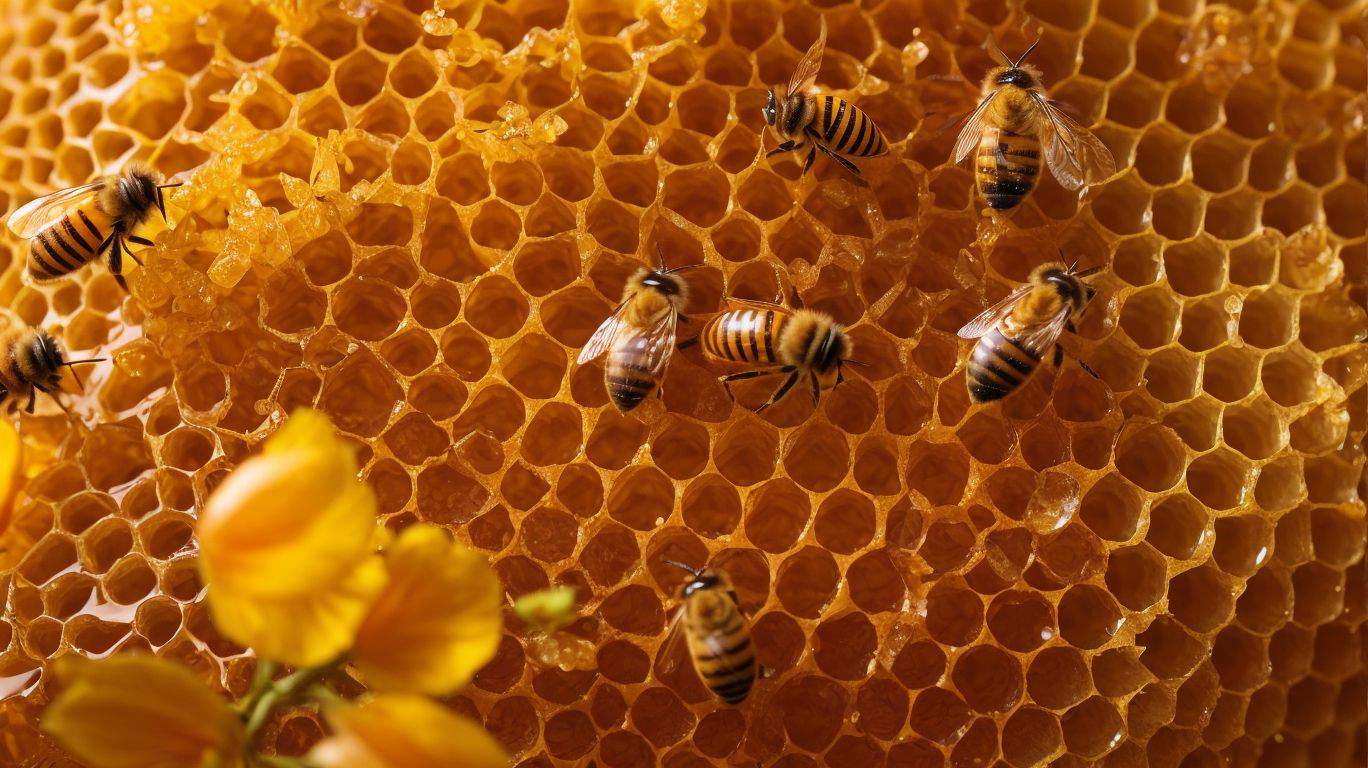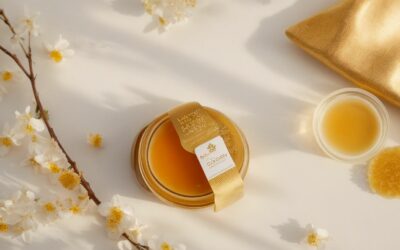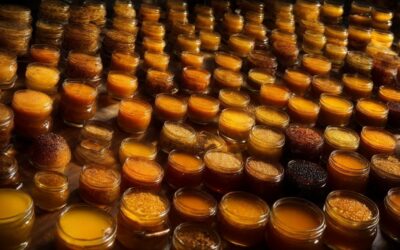Did you know that the sweet golden substance in your kitchen, honey, has proven to have antibacterial properties? Yes, you read that right – honey does more than just satisfy your sweet tooth.
In this article, we’ll explore the science behind this magical quality of honey and why it’s important for you and your family’s health.
Is Honey Antibacterial?
Yes, honey has natural antibacterial properties. It contains hydrogen peroxide, which has the ability to kill bacteria. Furthermore, honey has a low water content and acidic pH, making it difficult for bacteria to thrive.
Certain types of honey, such as UMF Manuka honey, have even more powerful antibacterial effects because of the compound methylglyoxal.
So, if you are in need of a natural antibacterial remedy, honey is a great choice. Just make sure to select raw, unprocessed honey for the best results.
How Does Honey Kill Bacteria?
Honey has multiple mechanisms that allow it to kill bacteria, making it a natural antibacterial agent effectively. Here are the steps by which honey eliminates bacteria:
- Due to its high sugar concentration, honey creates a hypertonic environment that draws water out of bacterial cells, causing them to shrink.
- Honey contains an enzyme called glucose oxidase, which produces hydrogen peroxide. This compound has antimicrobial properties and effectively kills bacteria.
- The low pH levels in honey create an acidic environment that inhibits bacterial growth.
- Honey also contains antioxidants that can disrupt bacterial cell membranes and DNA, ultimately leading to cell death.
With these combined actions, honey is a powerful antibacterial agent that promotes wound healing and prevents infections.
What are the Types of Bacteria that Honey is Effective Against?
Honey contains natural antibacterial properties that make it effective against various types of bacteria.
Some common bacteria that honey can combat include Staphylococcus aureus, Escherichia coli, and Salmonella, all of which are known to cause infections and foodborne illnesses.
The antimicrobial properties of honey are due to its low water content, acidic pH, and the presence of hydrogen peroxide and other bioactive compounds.
Studies have demonstrated that honey has the ability to inhibit the growth and activity of these bacteria, making it a potential natural alternative for treating infections.
However, it is important to note that the effectiveness of honey against specific bacteria may vary depending on factors such as the type of honey and the strain of bacteria.
What are the Other Health Benefits of Honey?
While honey has long been known for its antibacterial properties, there is much more to this sweet and sticky substance. In this section, we will delve into the lesser-known health benefits of honey.
From soothing sore throats to aiding in wound healing, there are numerous ways that honey can benefit our overall well-being.
We will also explore how honey may potentially help with allergies, making it a versatile and multi-faceted ingredient for both culinary and medicinal purposes.
1. Soothes Sore Throats
Soothing a sore throat can be easily achieved with the natural properties of honey. To utilize honey for this purpose, follow these steps:
- Choose raw or Manuka honey for maximum benefits.
- Mix the honey with warm water or herbal tea.
- Add a squeeze of lemon or a dash of ginger for enhanced relief.
- Gargle the mixture for a few seconds, allowing the honey to coat the throat.
- Slowly swallow the mixture to provide soothing and lubrication to the throat.
2. Aids in Wound Healing
Using honey for wound healing can be beneficial due to its antimicrobial and anti-inflammatory properties. Here are the steps to use honey for wound healing:
- Clean the wound thoroughly with mild soap and water.
- Apply a thin layer of honey directly to the wound to aid in wound healing.
- Cover the wound with a sterile dressing or bandage.
- Change the dressing and reapply honey every 24 to 48 hours, or as advised by a healthcare professional.
- Monitor the wound for any signs of infection, such as increased pain, redness, swelling, or pus.
- Continue using honey until the wound heals completely.
Honey promotes wound healing by reducing inflammation, stimulating tissue regeneration, and preventing infection. However, if the wound does not improve or worsens, consult a healthcare professional.
3. May Help with Allergies
Including honey in your diet may potentially provide relief for allergies. Here are some steps to incorporate honey for potential allergy relief:
- Choose local, raw honey: Opt for honey that is sourced locally as it may contain traces of local pollen, which can help build tolerance in the body.
- Start with small amounts: Begin by consuming a teaspoon of honey daily and gradually increase the dosage over time.
- Consult with a healthcare professional: If you have severe allergies or are unsure about incorporating honey into your routine, it’s best to seek personalized advice from a healthcare professional.
- Be consistent: Consistency is key. Make sure to incorporate honey into your daily routine to potentially see long-term benefits.
- Combine with other allergy management strategies: Honey can complement other allergy management strategies such as avoiding triggers and taking prescribed medication.
How do you choose the right honey for antibacterial properties?
When selecting honey for its antibacterial properties, follow these steps:
- Choose raw, unprocessed honey as it contains more antibacterial properties.
- Check for a high pollen content, as it indicates a higher level of antibacterial activity.
- Consider purchasing honey with a low water content, as bacteria thrive in moist environments.
- Opt for honey with a low glycemic index, as high sugar levels can promote bacterial growth.
The ancient Egyptians used honey as a natural antibacterial agent, as evidenced by honey jars found in tombs that still contained edible honey after thousands of years.
The antibacterial properties of honey have been recognized and utilized by various cultures throughout history.
What are the side effects of using honey as an antibiotic?
When using honey as an antibacterial, it is generally safe with minimal side effects. However, it is important to keep a few considerations in mind.
- Infants under one year should not be given raw honey due to the risk of botulism.
- Some individuals may experience an allergic reaction to honey, resulting in symptoms such as itching, swelling, or difficulty breathing.
- Honey may also interact with certain medications or affect blood sugar levels in people with diabetes.
It is always recommended to consult with a healthcare professional before using honey as an antibacterial.
Additionally, it is advisable to use honey in conjunction with traditional medical treatments for optimal results.
Frequently Asked Questions
What makes honey antibacterial?
Honey contains a high concentration of sugar, low pH levels, and hydrogen peroxide, all of which contribute to its antibacterial properties.
Is honey effective against all types of bacteria?
While honey has been found to be effective against a wide range of bacteria, its specific effectiveness may vary depending on the type of bacteria and the type of honey being used.
What is the science behind honey’s antibacterial properties?
The unique combination of sugar, low pH levels, and hydrogen peroxide in honey creates an environment that is inhospitable to bacteria, making it difficult for them to survive and reproduce.
Can honey be used to treat infections or wounds?
Yes, some studies have shown that honey can be an effective treatment for infections and wounds due to its antibacterial properties. However, it is important to consult a healthcare professional before using honey as a medical treatment.
Are there any drawbacks to using honey as an antibacterial agent?
While honey does have antibacterial properties, it should not be considered a replacement for traditional medical treatments. Additionally, some people may have allergies to honey, so it is important to be cautious when using it for medicinal purposes.
How can I incorporate honey into my daily routine for its antibacterial benefits?
Honey can be used in a variety of ways, such as adding it to tea or using it as a natural sweetener in cooking. You can also apply it topically to minor cuts or wounds for its antibacterial properties. However, always be sure to use pure, unprocessed honey for maximum benefits.
I’m a Manuka honey enthusiast and creator of Manuka Honey Organic, a blog where I share my journey with authentic Manuka honey from New Zealand. I want everyone to learn about the healing powers of Manuka honey.





